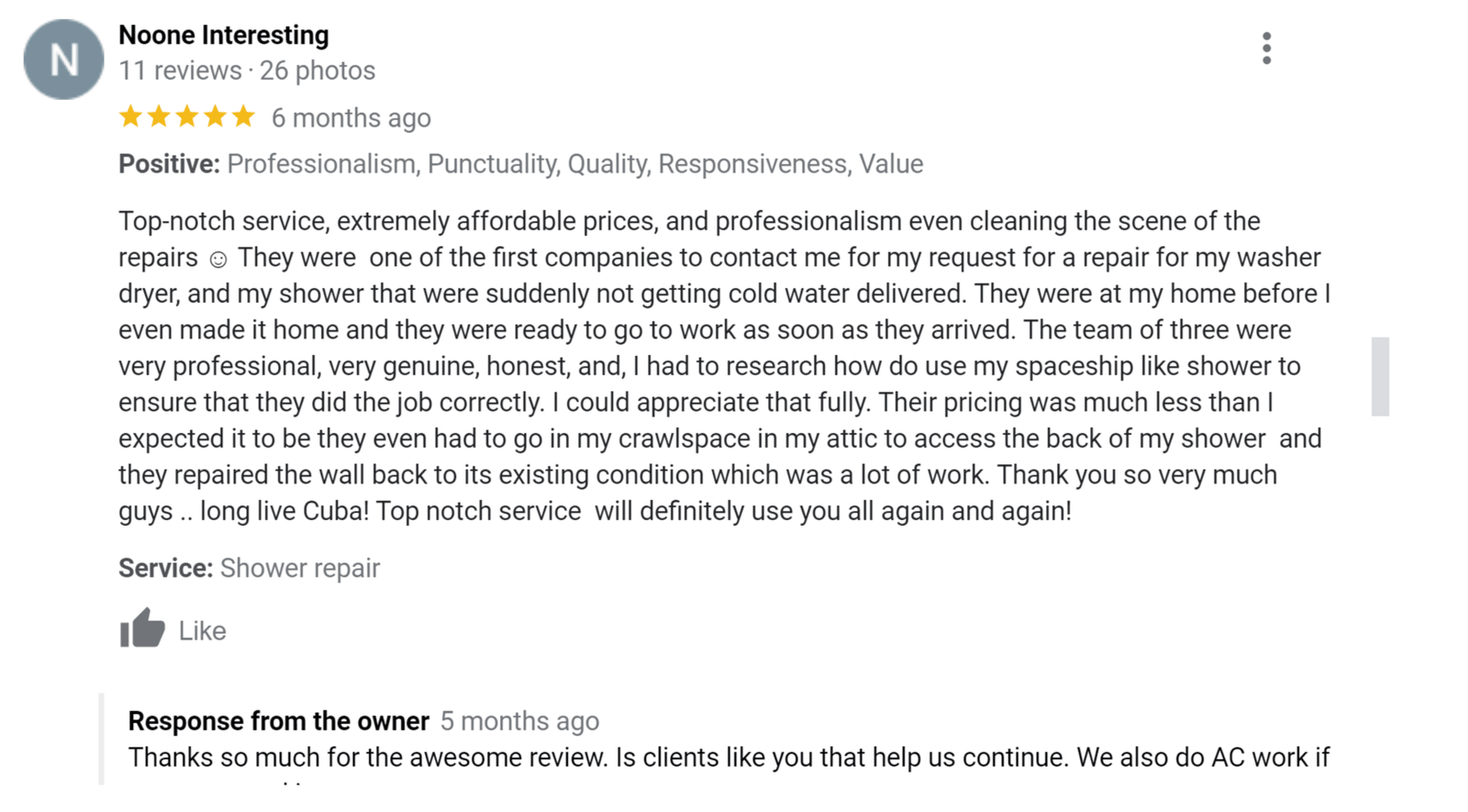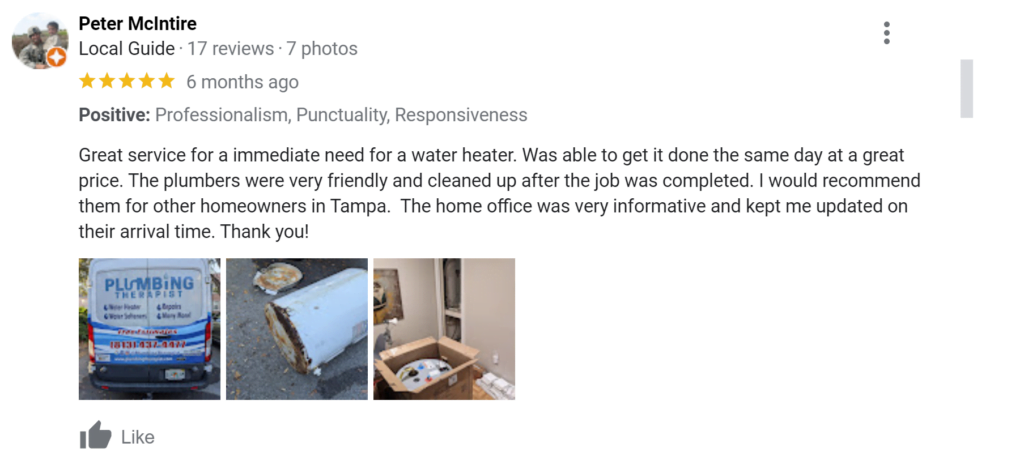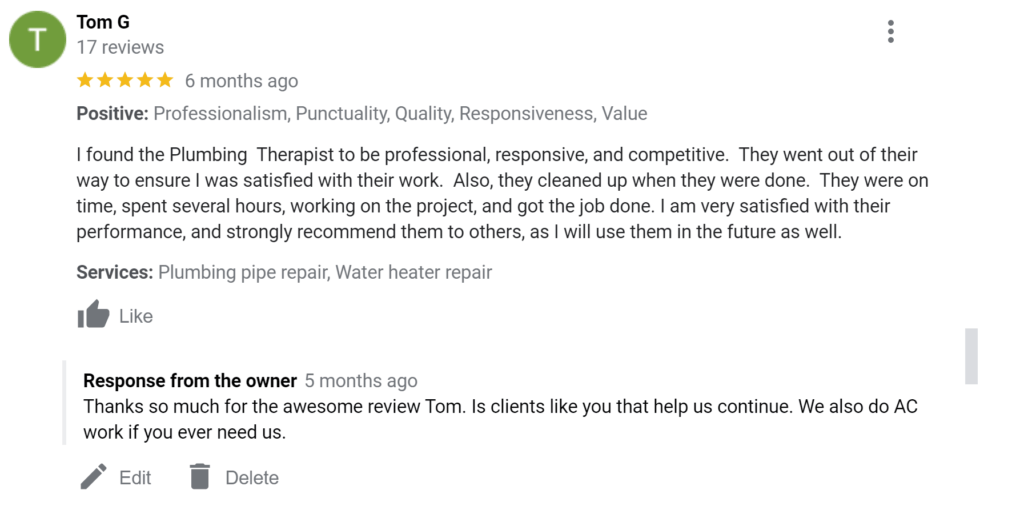Water Heater Repair
Experience reliable hot water again with Plumbing Therapist’s water heater repair service. We fix all types of water heaters quickly and effectively.
Do You Need Our Help ?
Feel free to contact us now
$99 Water Heater Flush + Free Plumbing System Inspection
Water Heater Repair in Tampa Bay
Expert Water Heater Repair Services in Hillsborough County, Pinellas County, and Pasco County
Water heater repair is the process of fixing issues with your water heating system. When your water heater acts up, causing cold water shocks or inconsistent temperatures, it’s time to call in the experts.
At Plumbing Therapist, we know that a functioning water heater is crucial for your comfort and daily routines. Our water heater repair services in the Tampa Bay area are designed to ensure you have reliable access to hot water when you need it most.
Why Choose Our Water Heater Repair Services?
Here at Plumbing Therapist, we take pride in being your top choice for water heater repair in the Tampa Bay area. Here’s why I believe you should choose us:
1. Prompt Service: When you’re dealing with a water heater problem, you don’t want to wait. We understand the urgency, and I personally ensure our team responds swiftly, providing efficient repairs to restore your hot water as soon as possible.
2. Expert Technicians: Our team consists of highly skilled technicians, and I can assure you that I’ve personally selected them for their expertise. They specialize in diagnosing and fixing water heater issues of all kinds. No matter what type or brand of water heater you have, we’ve got you covered.
3. Quality Repairs: I believe in doing the job right the first time. That’s why we use only top-quality replacement parts to ensure long-lasting results. You shouldn’t have to deal with the same problem again, and I’m committed to making sure you don’t.
4. Preventative Maintenance: Beyond repairs, we offer maintenance services to extend the lifespan of your water heater. I know that regular maintenance can help you avoid future breakdowns and save on repair costs. It’s all about looking out for your long-term comfort and satisfaction.
5. Customer Satisfaction: I personally stand behind our commitment to customer satisfaction. My friendly and professional team is here to address your concerns and provide solutions tailored to your needs. Your happiness is our ultimate goal.
6. Transparent Pricing: You can trust us for fair and transparent pricing. I believe in giving you upfront estimates, so you know exactly what to expect before we start the repair work. No surprises, just honest service.
7. Local Expertise: As a local plumbing company, I understand the unique challenges of the Tampa Bay area. I’m dedicated to serving our community with reliable water heater repair services that you can depend on.
Choose Plumbing Therapist for water heater repair, and you’re choosing a company that’s committed to your comfort and satisfaction. I personally invite you to contact us today to schedule your water heater repair service. Your hot water is in good hands with us.

Why partner with Plumbing Therapist?
Quality, Affordability, and Expertise.

No Hidden or Unexpected Charges

Free Estimates & Online Booking Available

Professionally Trained Technicians

Honesty is Guaranteed

Quick Communication & Service Within 24 Hours

400+ 5 Star Reviews

Why do I need to repair my water heater?
Repairing your water heater is essential for several important reasons:
Consistent Hot Water: A functioning water heater ensures you have a reliable supply of hot water for various household tasks, including bathing, cleaning, and washing dishes. Repairing it keeps your daily routines comfortable and convenient.
Energy Efficiency: A faulty water heater may work harder to produce hot water, leading to increased energy consumption and higher utility bills. Repairing it can restore its energy efficiency, saving you money in the long run.
Preventing Further Damage: Ignoring water heater issues can lead to more significant problems over time. Small leaks or minor malfunctions can escalate into major damage or the need for a costly replacement if not addressed promptly.
Safety: Malfunctioning water heaters can pose safety hazards. For example, a gas water heater with a faulty pilot light can lead to gas leaks, which are dangerous. Timely repairs ensure that your water heater operates safely.
Prolonging Lifespan: Regular maintenance and timely repairs can extend the lifespan of your water heater. This means you won’t have to invest in a costly replacement prematurely.
Avoiding Disruption: A broken water heater can disrupt your daily life, leading to cold showers and inconvenience. Repairing it promptly minimizes this disruption, allowing you to enjoy the comforts of hot water without interruption.
Environmental Impact: A well-maintained water heater is more environmentally friendly because it operates efficiently, reducing energy waste and lowering your carbon footprint.
If you would like more information, feel free to give them a call at (813)-437-4477 or you can book online and get their latest discount!
Customer Testimonials: Real Experiences with Plumbing Therapist
We proudly share the experiences and stories of our valued clients. Their feedback provides a glimpse into the quality of service and commitment to excellence we uphold at Plumbing Therapist. You'll read firsthand how our plumbing solutions have improved comfort and efficiency in homes across Tampa Bay. These testimonials illustrate our dedication to customer satisfaction and the difference our expert services can make.




Your questions answered
Common Water Heater Repair Questions:
Why is my water heater not producing hot water?
Several factors can cause a water heater to stop producing hot water. Here are some common reasons:
Heating Element Issues: In electric water heaters, one or both heating elements may fail over time. If they’re not functioning correctly, the water won’t heat up as it should.
Pilot Light Problems: Gas water heaters rely on a pilot light to ignite the burner. If the pilot light is out or not functioning correctly, the heater won’t heat the water.
Thermostat Malfunction: Faulty thermostats can prevent the water heater from reaching the desired temperature. This can result in lukewarm or cold water.
Sediment Buildup: Sediment can accumulate at the bottom of the tank, insulating the heating element from the water. This reduces the heater’s efficiency and can lead to less hot water.
Dip Tube Damage: The dip tube is responsible for directing cold water to the bottom of the tank, where it’s heated. If the dip tube is damaged or broken, it can cause cold water to mix with the hot water at the top of the tank.
Pressure Relief Valve Issues: The pressure relief valve is designed to release excess pressure. If it’s leaking, it can affect the water heater’s performance.
Tank Size: If your household demand for hot water exceeds the capacity of your water heater, you may run out of hot water, especially during periods of high usage.
Old Age: Water heaters have a limited lifespan, typically around 10-15 years. An older unit may struggle to produce hot water effectively.
Gas Supply Issues: In gas water heaters, problems with the gas supply line or gas valve can prevent the burner from igniting and heating the water.
Electrical Issues: For electric water heaters, issues with the electrical supply, such as a tripped circuit breaker or a faulty thermostat, can disrupt the heating process.
If your water heater is not producing hot water, it’s advisable to contact a professional plumber or technician to diagnose and repair the issue. They can assess the specific problem and recommend the appropriate repair or replacement if necessary.
How often should I have my water heater serviced?
The frequency of servicing your water heater can vary depending on several factors, including the type of water heater (gas or electric), local water quality, and the manufacturer’s recommendations. Here are some general guidelines:
Annual Maintenance: It’s a good practice to schedule an annual maintenance service for your water heater. This maintenance can include flushing the tank to remove sediment buildup, checking and cleaning components, and ensuring the heater is operating efficiently and safely.
Tankless Water Heaters: Tankless water heaters typically require less frequent maintenance than tank-style heaters. Many manufacturers recommend a professional inspection and maintenance every 1-2 years. However, it’s essential to check the manufacturer’s specific guidelines for your unit.
Water Quality: If you have hard water or poor water quality in your area, you may need more frequent maintenance. Hard water can lead to mineral deposits in the tank, reducing efficiency and potentially shortening the water heater’s lifespan.
Age of the Water Heater: Older water heaters may require more frequent inspections and maintenance to ensure they continue to operate safely and efficiently.
Visible Issues: If you notice any signs of trouble with your water heater, such as unusual noises, leaks, or inconsistent hot water, it’s essential to have it serviced promptly, regardless of the regular maintenance schedule.
Manufacturer’s Recommendations: Always consult the manufacturer’s guidelines and recommendations for your specific water heater model. They often provide information on maintenance schedules and necessary tasks.
Professional Inspection: Regardless of the frequency, it’s advisable to have a professional plumber or technician perform water heater inspections and maintenance. They can identify issues that may not be apparent to homeowners and ensure your water heater operates optimally and safely.
What are the signs that my water heater needs repair?
Several signs indicate that your water heater may need repair. If you notice any of the following issues, it’s essential to address them promptly to prevent further damage or a complete breakdown:
Lack of Hot Water: If your water heater isn’t producing hot water or if the hot water supply is inconsistent, it’s a clear sign of a problem.
Inadequate Hot Water: If you’re running out of hot water quickly, especially during periods of high demand, it could indicate a heating element or thermostat issue.
Unusual Noises: Strange noises, such as popping, cracking, or rumbling sounds, can signal sediment buildup in the tank, which can affect heating efficiency.
Leaking: Any visible leaks around the water heater or in the surrounding area should be addressed immediately, as they can lead to water damage and structural issues.
Discolored Water: Rusty or discolored water coming from your hot water taps can indicate corrosion inside the tank or deteriorating anode rods.
Foul Odors: A foul smell in the hot water may be due to bacterial growth inside the tank. This can happen when the water temperature is set too low.
Fluctuating Water Temperatures: If the water temperature varies unexpectedly, it could be a thermostat issue or a problem with the heating element.
Visible Rust or Corrosion: Inspect the water heater for signs of rust or corrosion on the tank or pipes, as this can weaken the system over time.
High Energy Bills: A sudden increase in your energy bills without a clear explanation could be due to decreased water heater efficiency, indicating a need for repair.
Old Age: If your water heater is approaching or past its expected lifespan (typically 10-15 years), it’s more likely to develop problems and may need repair or replacement.
Pilot Light Issues (Gas Heaters): For gas water heaters, if the pilot light frequently goes out or has difficulty staying lit, it may indicate a problem with the thermocouple or gas supply.
Water Pressure Problems: Reduced water pressure or a noticeable reduction in flow rate can be a sign of sediment buildup or other issues in the water heater.
How long can I expect my water heater to last after a repair?
The lifespan of a water heater after a repair can vary depending on several factors, including the age and condition of the unit, the quality of the repair, and how well you maintain the water heater. Here are some considerations:
Age of the Water Heater: The age of the water heater plays a significant role. If your water heater is already quite old when it undergoes a repair, it may have limited remaining lifespan, even with the repair.
Quality of Repair: The quality of the repair itself is crucial. A well-executed repair by a professional technician can extend the life of your water heater significantly. However, if the repair is temporary or doesn’t address the underlying issue adequately, it may not last as long.
Maintenance: Regular maintenance can help prolong the life of your water heater after a repair. Following manufacturer-recommended maintenance schedules and addressing issues promptly can prevent further problems.
Water Quality: The quality of your local water supply also matters. If you have hard water or water with high mineral content, it can lead to sediment buildup and corrosion, potentially shortening the life of the water heater, even after a repair.
Type of Repair: The nature of the repair matters. Some repairs, such as replacing a faulty thermostat or heating element, can extend the water heater’s life. In contrast, other repairs, like addressing extensive corrosion or leaks, may be more of a temporary solution.
Regular Inspections: After a repair, it’s a good practice to have your water heater regularly inspected by a professional technician. They can identify potential issues and address them before they lead to more significant problems.
In general, a well-maintained and adequately repaired water heater can continue to provide reliable service for several years. However, it’s essential to monitor its performance, stay proactive with maintenance, and be prepared for the eventual need for replacement, especially if the water heater is already older or has a history of significant issues.
Is it worth it to repair a hot water heater?
Whether it’s worth it to repair a hot water heater depends on several factors. Here are some considerations to help you make an informed decision:
Age of the Water Heater: The age of the water heater is a significant factor. If your water heater is relatively new (less than 5-7 years old) and encounters a repairable issue, it’s often more cost-effective to repair it. Newer units typically have more years of service left in them.
Nature of the Problem: The specific problem with the water heater matters. Some issues, such as a faulty thermostat, heating element, or pressure relief valve, are relatively inexpensive to repair and extend the unit’s life. However, if the problem is extensive, such as significant tank corrosion or multiple component failures, the cost of repair may be high.
Repair Costs: Consider the cost of the repair compared to the cost of a new water heater. If the repair cost is relatively low and significantly less than the price of a new unit, repair might be the more cost-effective choice.
Energy Efficiency: Older water heaters are often less energy-efficient than newer models. If your water heater is inefficient and costly to operate, investing in a more energy-efficient replacement may be a better long-term financial decision.
Warranty: Check if your water heater is still under warranty. If it is, the repair cost may be covered by the manufacturer, making repair an attractive option.
Future Maintenance: Consider the potential for future maintenance and repair costs. If your water heater has a history of frequent breakdowns or if it’s nearing the end of its expected lifespan, you may want to weigh the long-term cost of repairs against the cost of a new, more reliable unit.
Energy Savings: Newer water heaters are often more energy-efficient, leading to lower utility bills. If your old water heater is inefficient, replacing it with a new, energy-efficient model can lead to long-term savings.
Environmental Impact: Energy-efficient water heaters are also more environmentally friendly, as they reduce energy consumption and carbon emissions.
Are there energy-efficient upgrades available for my water heater during repairs?
Yes, there are several energy-efficient upgrades and enhancements available for your water heater during repairs. These upgrades can improve the efficiency of your water heater, reduce energy consumption, and potentially lower your utility bills. Here are some energy-efficient options to consider:
Insulation: Adding additional insulation to your water heater can help it retain heat more effectively, reducing standby heat loss. Insulation blankets or jackets designed for water heaters are readily available.
Timer: Installing a timer on your water heater can allow you to schedule when it operates. You can set it to heat water only during times of high demand, such as mornings and evenings, and turn it off during periods of low use, like overnight.
Thermostatic Mixing Valve: A thermostatic mixing valve allows you to set a specific water temperature, which can help prevent scalding and reduce the need to mix hot and cold water. This can save energy by ensuring your water heater isn’t overheating the water.
Heat Traps: Heat traps are valves or fittings that prevent heat from escaping through the hot water pipes when the heater is not in use. They can be installed on the hot and cold water pipes connected to the heater.
Low-Flow Fixtures: If you’re repairing your water heater and upgrading your plumbing fixtures, consider installing low-flow showerheads and faucets. These reduce hot water usage, which can lead to energy savings.
Expansion Tanks: Expansion tanks help manage pressure changes in your water heater system, which can extend the life of the heater and improve efficiency.
Solar Water Heater Add-Ons: If you have a solar water heater, you can explore enhancements like more efficient solar panels or backup heating elements to ensure consistent hot water, even on cloudy days.
Tankless Conversion: If you have a tank-style water heater, you might consider converting to a tankless water heater during repairs. Tankless heaters are highly efficient, as they only heat water on demand, reducing standby energy loss.
Regular Maintenance: While not an upgrade per se, regular maintenance of your water heater is essential for optimizing its efficiency. Flushing the tank to remove sediment buildup and inspecting and cleaning components can improve performance.
